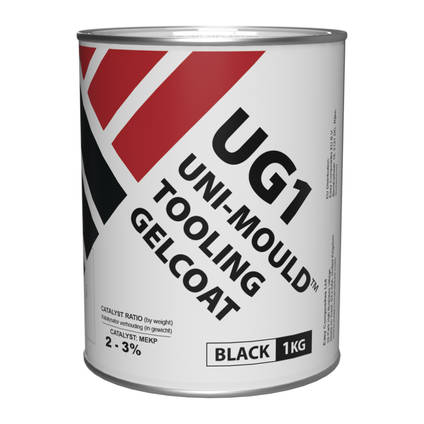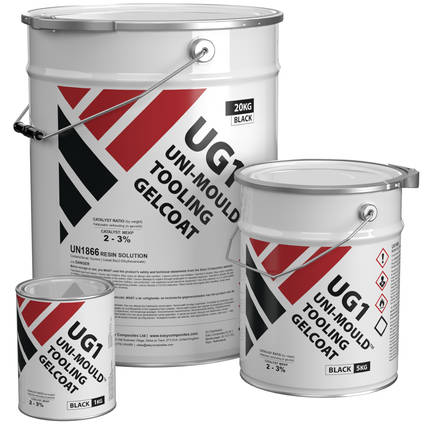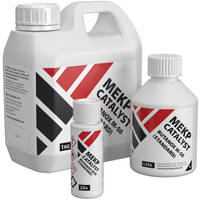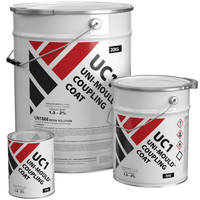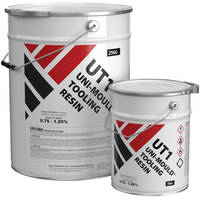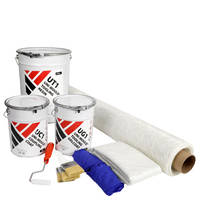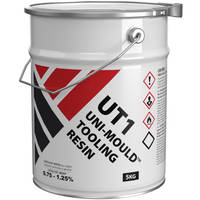Need any help or advice?+44 (0)1782 454499
Downloads (3)
This is a chemical product. Before storage or use you must download and read the accompanying safety and technical datasheets.
| Safety Datasheet (SDS) - NL | ||
| Safety Datasheet (SDS) - EN | ||
| Technical Datasheet (TDS) |
Specification
Product Data
| Colour | Black | |
|---|---|---|
| Chemistry / Material | Vinylester | |
| Viscosity | 7000 | mPa.s |
Cured Mechanical Properties
| Max Service Temp | 90 | °C |
|---|---|---|
| Hardness | 70 (Hard) | Shore D |
| Flexibility | Hard / Rigid | |
| Tensile Strength | 38.58 | MPa |
| Flexural Strength | 155.2 | MPa |
| Flexural Modulus | 3.44 | GPa |
| Elongation at Break | 2.1 | % |
Pot Life and Cure Times
| Pot Life (Typical) | 15 | mins |
|---|---|---|
| Initial Cure Time | 4 | Hrs |
| Full Cure Time | 7 | Days |
General Properties
| Gross Weight | 1.158 | kg |
|---|
Shipping Information
Restrictions
This product is classed as dangerous goods for transport.
It can be shipped to all mainland EU countries, Ireland, Balearic Islands, Corsica, Sicily and Sardinia.
Unfortunately, for the time being we are unable to ship dangerous goods to Cyprus, Malta, the Canary Islands, Ceuta, Melilla, Jan Mayan and Svalbard.
For a full information regarding the shipment of dangerous goods, see our delivery information page.
Package Size
There are no package size restrictions or surcharges for this product.
Delivery Cost
To find the delivery cost of this item to your address, add it to your basket and then use the instant shipping calculator on the basket page.
UG1 Uni-Mould Tooling Gelcoat
- UG1-1
Hazardous
- 3.5/5 Average rating
UG1 Uni-Mould Tooling Gelcoat is a hard-wearing yet highly polishable vinylester gelcoat for composite moulds and tools. Its high service temperature and compatibility with epoxy resin make it the perfect mould surface for the production of epoxy components, including resin infusion and even some low cure-temperature prepregs.
This high performance tooling gelcoat can be used as a gelcoat for conventional fibreglass mould production, or as part of the Uni-Mould rapid tooling system.
Requires MEKP catalyst, not included. Available to buy online in 1kg and 5kg tins.
PRODUCT VERSIONS
Pack Size
AVAILABILITY:Out of Stock
New stock is on its way. If you order this product, your whole order will be held and then dispatched to you as soon as this product is back in stock.
100 more can built in 2-3 days
Optional items
PRODUCT OPTIONSNew stock is on its way. If you order this product, your whole order will be held and then dispatched to you as soon as this product is back in stock.
We won’t be beaten on price!
If you believe you’re buying an equivalent product cheaper elsewhere, contact us to discuss your requirements.
UG1 Uni-Mould Tooling Gelcoat is part of the Uni-Mould™ universal mould making system and should be used in conjunction with Uni-Mould Coupling Coat and Uni-Mould Tooling Resin to produce hard-wearing, polishable moulds of any size with minimal shrinkage, suitable for use in just about any composites process.
For full details on the Uni-Mould system, read our Uni-Mould Introduction and Application Guide.
UG1 Uni-Mould Tooling Gelcoat is a filled, vinylester tooling Gelcoat compatible with epoxy, polyester and vinylester resin systems meaning that parts made using any of these resin systems will reliably release from moulds made with a UG1 Uni-Mould Tooling Gelcoat surface.
Moulds made using Uni-Mould are fully compatible with all widely used resin systems (including epoxy, polyester and vinylester).
Requires MEKP catalyst (not included)
Suggested Purchasing Quantities
Use the table below to help you purchase suitable quantities of the resins and glass for a given mould size.
| Uni-Mould Resin | Chopped Strand Mat | ||||
|---|---|---|---|---|---|
| The table is NOT an exact guide to the ratios of the materials but is rounded up to the nearest purchasable pack size or weight of mat. | |||||
| Mould Area | Tooling Gel | Coupling Coat | Tooling Resin | 100g | 450g |
| 0.6sqm | 1kg | 1kg | 5kg | 2sqm | 2kg |
| 3.5sqm | 5kg | 5kg | 25kg | 7sqm | 7kg |
| 13sqm | 10kg | 25kg | 100kg | 26sqm | 25kg |
Further Information
Application
UG1 Uni-Mould Tooling Gelcoat should be catalysed at 2-3% using standard MEKP catalyst (not included). Before application allow the catalysed Gelcoat to stand for a few minutes to settle and de-gas.
The vinylester gelcoat should be applied in two applications. For the first application aim for a consistent thickness of ~0.5mm. Allow the first application to cure for around 4-8hrs (at 20°C room temperature) before applying the second coat of Gelcoat, again aiming for a thickness of ~0.5mm.
Allow the gelcoat to cure for 4-8hrs (at 20°C room temperature), preferably overnight.
UG1 Uni-Mould Tooling Gelcoat should then be backed up with Uni-Mould Coupling Coat and Uni-Mould Tooling Resin as per the guidelines for those products.
Use with Prepregs
Although it is possible to use Uni-Mould moulds with out-of-autoclave (oven cure) prepregs (such as XPREG® XC110) we no longer recommend Uni-Mould moulds for this purpose.
Instead – for prepreg use – better results will be achieved using high temperature epoxy moulds made using our EG160 / EMP160 tooling system or XPREG® XT135 Tooling Prepreg. These high temperature epoxy tooling systems allow the prepreg to be cured at the optimum 120°C which reduces the cure time and improves the mechanical properties of the component. Additionally, epoxy tools have been found to result in a better surface finish with prepregs such as XPREG® XC110.
Compatibility Information - Dos and Don'ts
Although by no means an exhaustive list, the Pattern materials, release agents and additives listed below have all been tested and are known to work well with Uni-Mould Tooling Gelcoat.
Compatible Patterns
- Pattern Coat Primer
- Pattern Coat High Gloss
- Epoxy and Polyester resin based patterns (with suitable release agent)
- Polypropylene and polyethylene sheet
- Aluminium (with suitable release agent)
- Toughened Glass (with suitable release agent)
Incompatible / High-Risk Materials
- Fresh/newly applied paint
- Rattle-can (especially 1k) paints
- Polyester bodyfiller
- Styrofoam/XPS/EPS foam (will dissolve on contact!)
Compatible Release Agents
- Easy-Lease Chemical Release Agent
- PVA Mould Release
- No 8 Mould Release Wax
Compatible Additives
- Solution MW Wax Additive
Key Processing Information
- Ease of Use: Suitable for professional and hobby use (follow SDS advice).
- Odour: UG1 has a strong styrene based odour.
- Styrene Based Materials: The Styrene in the gelcoat may etch or dissolve styrene based materials such as ABS plastics and Polystyrene based foams.
- Safety Precautions: Wear gloves and goggles and work in a well ventilated area. Always read the SDS before use.
- Ambient Conditions: Can be used from 15 to 30°C although pot-life and cure time will be affected significantly. Recommended working at an ambient of 20°C.
- Mix Ratio: Add MEKP Catalyst at a ratio of 2 - 3%. Use digital scales.
- Mixing: Mix thoroughly by hand for at around 2 minutes.
- Application: Can be applied by brush. Coating thickness ~0.5mm. Minimum of two coatings recommended.
- Pot-Life: The pot life at 20°C is 15 minutes. Be sure to use your resin before this time.
- Exotherm (Over-Heating): Resin will heat-up whilst it cures. Mix in small batches and use expediently. Mixed resin in a pot will quickly overheat (exotherm) and can smoke/ignite. Never leave mixed resin unattended.
- Cure Time/Demould: At 20°C allow the gelcoat to cure for a 4-8 hours, preferably overnight before backing with Coupling Coat.
- Overcoating / Second Coatings: We recommend 2 coatings of 0.5mm per coating for best results.
- Maximum Service Temperature: When fully cured and post cured, the maximum Service Temerpature of Uni-Mould moulds is 90°C
- Shelf Life: UG1 Uni-Mould tooling gelcoat has a shelf-life of 3 months.
UG1 Uni-Mould Tooling Gelcoat is part of the Uni-Mould™ universal mould making system and should be used in conjunction with Uni-Mould Coupling Coat and Uni-Mould Tooling Resin to produce hard-wearing, polishable moulds of any size with minimal shrinkage, suitable for use in just about any composites process.
For full details on the Uni-Mould system, read our Uni-Mould Introduction and Application Guide.
UG1 Uni-Mould Tooling Gelcoat is a filled, vinylester tooling Gelcoat compatible with epoxy, polyester and vinylester resin systems meaning that parts made using any of these resin systems will reliably release from moulds made with a UG1 Uni-Mould Tooling Gelcoat surface.
Moulds made using Uni-Mould are fully compatible with all widely used resin systems (including epoxy, polyester and vinylester).
Requires MEKP catalyst (not included)
Suggested Purchasing Quantities
Use the table below to help you purchase suitable quantities of the resins and glass for a given mould size.
| Uni-Mould Resin | Chopped Strand Mat | ||||
|---|---|---|---|---|---|
| The table is NOT an exact guide to the ratios of the materials but is rounded up to the nearest purchasable pack size or weight of mat. | |||||
| Mould Area | Tooling Gel | Coupling Coat | Tooling Resin | 100g | 450g |
| 0.6sqm | 1kg | 1kg | 5kg | 2sqm | 2kg |
| 3.5sqm | 5kg | 5kg | 25kg | 7sqm | 7kg |
| 13sqm | 10kg | 25kg | 100kg | 26sqm | 25kg |
Further Information
Application
UG1 Uni-Mould Tooling Gelcoat should be catalysed at 2-3% using standard MEKP catalyst (not included). Before application allow the catalysed Gelcoat to stand for a few minutes to settle and de-gas.
The vinylester gelcoat should be applied in two applications. For the first application aim for a consistent thickness of ~0.5mm. Allow the first application to cure for around 4-8hrs (at 20°C room temperature) before applying the second coat of Gelcoat, again aiming for a thickness of ~0.5mm.
Allow the gelcoat to cure for 4-8hrs (at 20°C room temperature), preferably overnight.
UG1 Uni-Mould Tooling Gelcoat should then be backed up with Uni-Mould Coupling Coat and Uni-Mould Tooling Resin as per the guidelines for those products.
Use with Prepregs
Although it is possible to use Uni-Mould moulds with out-of-autoclave (oven cure) prepregs (such as XPREG® XC110) we no longer recommend Uni-Mould moulds for this purpose.
Instead – for prepreg use – better results will be achieved using high temperature epoxy moulds made using our EG160 / EMP160 tooling system or XPREG® XT135 Tooling Prepreg. These high temperature epoxy tooling systems allow the prepreg to be cured at the optimum 120°C which reduces the cure time and improves the mechanical properties of the component. Additionally, epoxy tools have been found to result in a better surface finish with prepregs such as XPREG® XC110.
Compatibility Information - Dos and Don'ts
Although by no means an exhaustive list, the Pattern materials, release agents and additives listed below have all been tested and are known to work well with Uni-Mould Tooling Gelcoat.
Compatible Patterns
- Pattern Coat Primer
- Pattern Coat High Gloss
- Epoxy and Polyester resin based patterns (with suitable release agent)
- Polypropylene and polyethylene sheet
- Aluminium (with suitable release agent)
- Toughened Glass (with suitable release agent)
Incompatible / High-Risk Materials
- Fresh/newly applied paint
- Rattle-can (especially 1k) paints
- Polyester bodyfiller
- Styrofoam/XPS/EPS foam (will dissolve on contact!)
Compatible Release Agents
- Easy-Lease Chemical Release Agent
- PVA Mould Release
- No 8 Mould Release Wax
Compatible Additives
- Solution MW Wax Additive
Key Processing Information
- Ease of Use: Suitable for professional and hobby use (follow SDS advice).
- Odour: UG1 has a strong styrene based odour.
- Styrene Based Materials: The Styrene in the gelcoat may etch or dissolve styrene based materials such as ABS plastics and Polystyrene based foams.
- Safety Precautions: Wear gloves and goggles and work in a well ventilated area. Always read the SDS before use.
- Ambient Conditions: Can be used from 15 to 30°C although pot-life and cure time will be affected significantly. Recommended working at an ambient of 20°C.
- Mix Ratio: Add MEKP Catalyst at a ratio of 2 - 3%. Use digital scales.
- Mixing: Mix thoroughly by hand for at around 2 minutes.
- Application: Can be applied by brush. Coating thickness ~0.5mm. Minimum of two coatings recommended.
- Pot-Life: The pot life at 20°C is 15 minutes. Be sure to use your resin before this time.
- Exotherm (Over-Heating): Resin will heat-up whilst it cures. Mix in small batches and use expediently. Mixed resin in a pot will quickly overheat (exotherm) and can smoke/ignite. Never leave mixed resin unattended.
- Cure Time/Demould: At 20°C allow the gelcoat to cure for a 4-8 hours, preferably overnight before backing with Coupling Coat.
- Overcoating / Second Coatings: We recommend 2 coatings of 0.5mm per coating for best results.
- Maximum Service Temperature: When fully cured and post cured, the maximum Service Temerpature of Uni-Mould moulds is 90°C
- Shelf Life: UG1 Uni-Mould tooling gelcoat has a shelf-life of 3 months.
Specification
Product Data
| Colour | Black | |
|---|---|---|
| Chemistry / Material | Vinylester | |
| Viscosity | 7000 | mPa.s |
Cured Mechanical Properties
| Max Service Temp | 90 | °C |
|---|---|---|
| Hardness | 70 (Hard) | Shore D |
| Flexibility | Hard / Rigid | |
| Tensile Strength | 38.58 | MPa |
| Flexural Strength | 155.2 | MPa |
| Flexural Modulus | 3.44 | GPa |
| Elongation at Break | 2.1 | % |
Pot Life and Cure Times
| Pot Life (Typical) | 15 | mins |
|---|---|---|
| Initial Cure Time | 4 | Hrs |
| Full Cure Time | 7 | Days |
General Properties
| Gross Weight | 1.158 | kg |
|---|
It's always worth testing a small amount on a discrete area first to check that the gelcoat wont attack the vinyl. If you still have the vinyl left over, you could even apply your chosen release agent and do a test with some of the gel to make sure that it releases okay. Apart from that it should be fine, applying vinyl over a part is a well used technique when the finish of the part may not be compatible with the chosen tooling gel and the original needs to be protected.
There is really very little you need to consider in terms of storing Uni-Mould moulds in the long term. We've had moulds that we've used for many years, sometimes using them every day, other times using them every few months. The only likely condition that could do them any harm would be if they were stored in very damp conditions or out exposed to the weather and elements. Because you'll have an exposed glass fibre edge, over time, water could 'ingress' into the glass fibre and the moulds would deteriorate; this would take a long time however and would need require constant exposure to wet weather.
It's also worth pointing out that if you're using a semi-permanent release agent, like Easy Lease, you would need to give your moulds a fresh coat of release agent when you use them again if they've been in storage for anything more than a few weeks.
Yes, you will need MEKP Catalyst to cure any of our Uni-Mould resins, including the Tooling Gelcoat. You can order the MEKP from the product page and can also find the MEKP separately here: MEKP Catalyst
Really, any more than 4 layers at a time would be risking the mould overheating. If you wanted to go thicker, then you will need to wait for the first 4 layers to cure, then key the surface and apply another 4 layers (you need the 4 layer thickness to give you the heat to cure the resin)
The reason we can’t ship MEKP outside of the UK is because it is highly oxidizing, and standard carrier services do not permit it to be transported.
However you can purchase MEKP from any suppliers of composite materials including fibreglass (GRP) shops, roofing suppliers, boat buildings, car bodyshops etc. There is nothing special about the MEKP we supply, you can ask at your local supplier for ‘Standard reactivity MEKP’; brands such as Andanox KP9, Akperox A30, Butanox M50 (Akzo Nobel) are all suitable and widely available.
All the resins and gelcoats in the Uni-Mould tooling system have a shelf-life of 4 months. Recommended storage conditions are to use the original container, kept away from direct sunlight at temperature between 15°C and 25°C.
Uni-Mould moulds are based on a very high quality vinylester tooling gelcoat which will out-last more conventional polyester gelcoats. The special gelcoat is also highly polishable which means that hard-working moulds can be re-polished to restore them to original condition (something which is almost impossible with epoxy tools for example). The lifespan is dependent upon a number of factors, particularly how well they’re treated, but in our workshop we have found a well looked-after mould will give hundreds of releases. We have 7 year old moulds still in regular use!
Yes, certainly. What you need to remember though is that a combination of Uni-Mould Gelcoat and then a standard polyester resin won't have the high temperature capabilities that a full Uni-Mould system would have and also a standard polyester will be more prone to shrinkage so you should follow the time honoured process of laying up lots of thin layers, allowing the resin to cure almost fully between each layer as you build up the reinforcement. This will reduce shrinkage considerably but will mean it takes several more days to reinforce your mould.
You woudl make a repair to Uni-Mould tooling gelcoat in much the same way as you would make a repair to a normal polyester gelcoat. If you're making the repair on the surface side of the mould (the most likely reason because of a 'blister' or cracked out piece of gelcoat) then you would snap away any broken or loose gelcoat to reveal the blister in full and then mix up a tiny batch of Uni-Mould Tooling Gelcoat, catalyse it with MEKP and then add a single drop or two of Solution MW Wax Additive. You would then dab the gelcoat into the blister (using a lolipop stick or similar) to fill the cavity, leaving the new wet gelcoat slightly higher than the surrounding gelcoat of the mould. By adding the wax additive you'll ensure that the gelcoat cures properly on the surface (rather than stay tacky) making it much easier to flat and polish once it's cured. Finally, you just flat and polish the repair so that it's flush with the surrounding gelcoat.
We would not recommend applying the gelcoat with the cup gun as it is too thick for it to spray properly. Instead, we would suggest conventional brush application.
ASK YOUR OWN QUESTION
Customer Product Reviews for UG1 Uni-Mould Tooling Gelcoat
just finished de molding sanding and polishing. I did not measure the thickness but I have applied two coats with a brush as shown in the video and so far no cracks or chips. Easy to use as any other normal Gelcoat polishes to a perfect shine. will buy again and try it with the spray gun.
This is not getting any better! Very easy to work with. The result is smooth and durable.
I had 1 problem with this when laying onto glass but I think it released prematurely. rest of time it has worked perfectly
I have a few times now found this product impossible to get right. I have done my very best to apply the 0.3 - 0.4 layer and every time the second layer had cracked during the cure. I have tried thick, and thin as well just in case I was going mad. I would say that if you are new to this, a normal mould making process would be a better option where the Gel can be applied in one single go.
Hi Simon, thanks for the feedback and sorry to hear you've been having problems. This really is pretty-much our very best selling product and almost always the feedback and results are fantastic so we'd really like to get to the bottom of this for you. It is certainly possible to use the uni-mould system using a single layer of gelcoat, in just the same as you would with any gelcoat. The only reason we suggest two gelcoat layers is to reduce the potential for print-through and also give a more durable surface for a long-term mould. Please contact us if you'd like to discuss your issues further; we're here to help!
SUBMIT YOUR OWN PRODUCT REVIEW
We publish all reviews for verified purchases. Submit your own review and help other customers with their choices.SUBMIT YOUR OWN PRODUCT REVIEW
We publish all reviews for verified purchases. Submit your own review and help other customers with their choices.Shipping Information
Restrictions
This product is classed as dangerous goods for transport.
It can be shipped to all mainland EU countries, Ireland, Balearic Islands, Corsica, Sicily and Sardinia.
Unfortunately, for the time being we are unable to ship dangerous goods to Cyprus, Malta, the Canary Islands, Ceuta, Melilla, Jan Mayan and Svalbard.
For a full information regarding the shipment of dangerous goods, see our delivery information page.
Package Size
There are no package size restrictions or surcharges for this product.
Delivery Cost
To find the delivery cost of this item to your address, add it to your basket and then use the instant shipping calculator on the basket page.
RELATED PRODUCTS
CUSTOMERS ALSO PURCHASED
RELATED PRODUCTS
CUSTOMERS ALSO PURCHASED
100% SECURE
PAYMENT METHODS
Easy Composites EU B.V., registered in the Netherlands 73601195. All content copyright (C) Easy Composites Ltd, 2025. All rights reserved.
